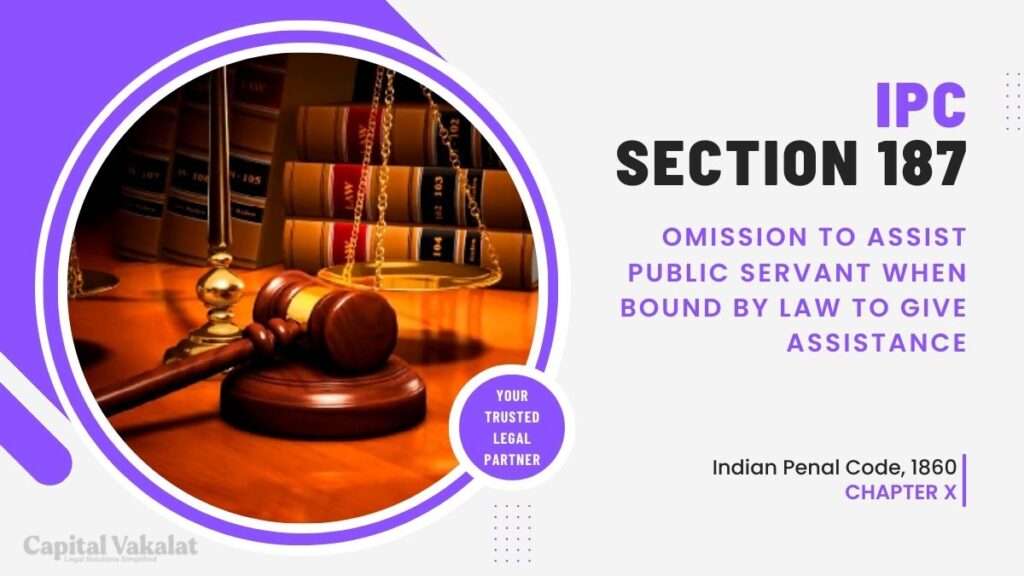Section 187 of the Indian Penal Code (IPC) deals with the offense of “Omission to Assist a Public Servant when bound by law to give assistance.” This section is a vital part of the IPC as it addresses the responsibilities and obligations of individuals towards public servants.

In this article, we will delve into the specifics of Section 187 IPC, its implications, and the legal consequences of failing to provide assistance as required by law.
Understanding Omission to Assist
Omission, in a legal context, refers to the act of not doing something that a person is legally bound to do. In the case of Section 187 IPC, it pertains to the failure to assist a public servant when it is a legal duty to do so. This duty is not only a legal obligation but also a moral and civic responsibility.
Legal Obligations of a Citizen
As responsible citizens, we are bound by certain legal obligations to assist public servants, such as the police, in the discharge of their duties. These obligations are in place to ensure the smooth functioning of law enforcement agencies and to maintain law and order in society.
Scope of Section 187 IPC
Section 187 IPC covers a wide range of scenarios where individuals can be held accountable for their omissions. It includes instances where a person is required to assist a public servant in arresting an offender, preventing the commission of a cognizable offense, or maintaining public peace.
Punishments and Penalties
Failure to fulfill these obligations can result in serious legal consequences. Section 187 IPC prescribes penalties that may include imprisonment and fines, depending on the severity of the omission and its impact on the public servant’s ability to perform their duties.
Cases and Precedents
Several legal cases and precedents highlight the application of Section 187 IPC. These cases serve as valuable references to understand the legal implications and the importance of assisting public servants.
Significance of Section 187 IPC
Section 187 IPC plays a crucial role in maintaining the balance between individual rights and the duties of a responsible citizen. It emphasizes the need for cooperation with public servants, especially in situations where public safety is at risk.
Balancing Rights and Duties
While citizens have rights, they also have a duty to assist public servants when required by law. This section of the IPC helps strike a balance between individual liberties and the greater good of society.
When Can You Be Charged?
Understanding when you can be charged under Section 187 IPC is essential. This can occur when you fail to assist a public servant in the performance of their lawful duties, leading to obstruction or hindrance.
Legal Defenses
In certain situations, there may be valid defenses against charges under Section 187 IPC. It is essential to know these defenses to protect your rights and uphold the law.
Recent Amendments
It’s important to stay updated with any recent amendments or changes to Section 187 IPC, as laws can evolve over time. Being aware of these changes can help you avoid legal pitfalls.
Implications for Society
The implications of Section 187 IPC go beyond legal consequences. It affects the overall behavior of citizens and their willingness to cooperate with public servants in maintaining law and order.
The Role of Public Servants
This section also sheds light on the challenges faced by public servants in the execution of their duties. It emphasizes the need for cooperation from citizens to ensure a safe and orderly society.
Conclusion
In conclusion, Section 187 IPC holds citizens accountable for their omissions when it comes to assisting public servants. It is a crucial element in maintaining law and order, and understanding its significance is vital for every responsible member of society.
In this article, we have explored the intricacies of Section 187 IPC, the legal obligations of citizens, and the consequences of failing to assist public servants when bound by law to do so. It is a reminder of the shared responsibility we all bear in upholding the law and ensuring the safety and well-being of our communities.
Frequently Asked Questions
What are the legal obligations of citizens under Section 187 IPC?
Citizens are legally obligated to assist public servants in various scenarios, such as preventing crimes or helping in arrests.
Can there be legal defenses against charges under Section 187 IPC?
Yes, there can be valid legal defenses, depending on the specific circumstances of the case.
Are there recent amendments to Section 187 IPC?
It’s essential to stay updated with any recent amendments, as laws may change over time.
Why is Section 187 IPC significant for society?
Section 187 IPC emphasizes the balance between individual rights and the duty to maintain law and order, making it crucial for a well-functioning society.